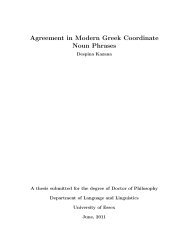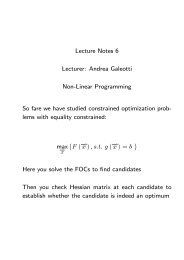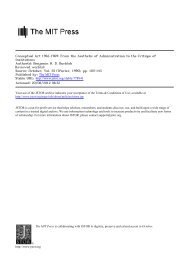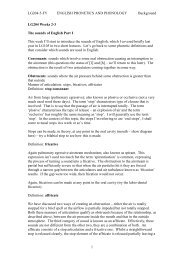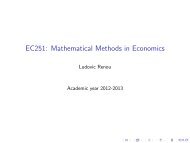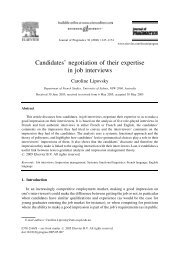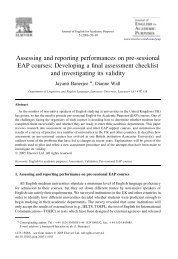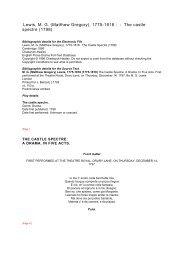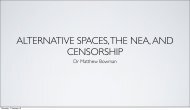Separate Tables: Schools and Sects in Political Science Author(s ...
Separate Tables: Schools and Sects in Political Science Author(s ...
Separate Tables: Schools and Sects in Political Science Author(s ...
Create successful ePaper yourself
Turn your PDF publications into a flip-book with our unique Google optimized e-Paper software.
<strong>Separate</strong> <strong>Tables</strong>: <strong>Schools</strong> <strong>and</strong> <strong>Sects</strong> <strong>in</strong> <strong>Political</strong> <strong>Science</strong><br />
<strong>Author</strong>(s): Gabriel A. Almond<br />
Source: PS: <strong>Political</strong> <strong>Science</strong> <strong>and</strong> Politics, Vol. 21, No. 4 (Autumn, 1988), pp. 828-842<br />
Published by: American <strong>Political</strong> <strong>Science</strong> Association<br />
Stable URL: http://www.jstor.org/stable/420022<br />
Accessed: 06/10/2008 05:17<br />
Your use of the JSTOR archive <strong>in</strong>dicates your acceptance of JSTOR's Terms <strong>and</strong> Conditions of Use, available at<br />
http://www.jstor.org/page/<strong>in</strong>fo/about/policies/terms.jsp. JSTOR's Terms <strong>and</strong> Conditions of Use provides, <strong>in</strong> part, that unless<br />
you have obta<strong>in</strong>ed prior permission, you may not download an entire issue of a journal or multiple copies of articles, <strong>and</strong> you<br />
may use content <strong>in</strong> the JSTOR archive only for your personal, non-commercial use.<br />
Please contact the publisher regard<strong>in</strong>g any further use of this work. Publisher contact <strong>in</strong>formation may be obta<strong>in</strong>ed at<br />
http://www.jstor.org/action/showPublisher?publisherCode=apsa.<br />
Each copy of any part of a JSTOR transmission must conta<strong>in</strong> the same copyright notice that appears on the screen or pr<strong>in</strong>ted<br />
page of such transmission.<br />
JSTOR is a not-for-profit organization founded <strong>in</strong> 1995 to build trusted digital archives for scholarship. We work with the<br />
scholarly community to preserve their work <strong>and</strong> the materials they rely upon, <strong>and</strong> to build a common research platform that<br />
promotes the discovery <strong>and</strong> use of these resources. For more <strong>in</strong>formation about JSTOR, please contact support@jstor.org.<br />
http://www.jstor.org<br />
American <strong>Political</strong> <strong>Science</strong> Association is collaborat<strong>in</strong>g with JSTOR to digitize, preserve <strong>and</strong> extend access to<br />
PS: <strong>Political</strong> <strong>Science</strong> <strong>and</strong> Politics.
<strong>Separate</strong><br />
<strong>Schools</strong> <strong>and</strong> <strong>Sects</strong><br />
<strong>in</strong> <strong>Political</strong> <strong>Science</strong>*<br />
Gabriel A. Almond<br />
Stanford University<br />
"'Miss Cooper: Lonel<strong>in</strong>ess is a terrible th<strong>in</strong>g<br />
Miss Cooper: Is any type an 'alone' type,<br />
Miss Meacham. . ?"<br />
<strong>Tables</strong><br />
(From Terence Rattigan's <strong>Separate</strong> <strong>Tables</strong>,<br />
(1955, 78, 92) GABRIEL A. ALMOND<br />
In <strong>Separate</strong> <strong>Tables</strong>, the hit of the 1955 New York theatrical season, the Irish playwright,<br />
Terence Rattigan, used the metaphor of solitary d<strong>in</strong>ers <strong>in</strong> a second-rate residential hotel <strong>in</strong><br />
Cornwall to convey the lonel<strong>in</strong>ess of the human condition. It may be a bit far fetched to<br />
use this metaphor to describe the condition of political science <strong>in</strong> the 1980s. But <strong>in</strong> some<br />
sense the various schools <strong>and</strong> sects of political science now sit at separate tables, each with<br />
its own conception of proper political science, but each protect<strong>in</strong>g some secret isl<strong>and</strong> of<br />
vulnerability.<br />
It was not always so. If we recall the state of the profession a quarter of a century ago,<br />
let us say <strong>in</strong> the early 1960s, David Easton's (1953) <strong>and</strong> David Truman's (1955) scold<strong>in</strong>gs of<br />
the profession for its backwardness among the social science discipl<strong>in</strong>es, had been taken to<br />
heart by a substantial <strong>and</strong> productive cadre of young political scientists. In 1961 Robert<br />
Dahl wrote his Epitaph for a Monument to a Successful Protest reflect<strong>in</strong>g the sure confidence<br />
of a successful movement, whose leaders were rapidly becom<strong>in</strong>g the most visible figures <strong>in</strong><br />
the profession. Neither Dahl nor He<strong>in</strong>z Eulau, whose Behavioral Persuasion appeared <strong>in</strong><br />
1963 made exaggerated or exclusive claims for the new political science. They expressed<br />
the view that the scientific approach to the study of political phenomena had proven itself,<br />
<strong>and</strong> that it could take its place alongside political philosophy, public law, <strong>and</strong> <strong>in</strong>stitutional<br />
history <strong>and</strong> description, as an important approach to the study of politics. As the part of<br />
the discipl<strong>in</strong>e "on the move," so to speak, it created some worry among the older subdiscipl<strong>in</strong>es.<br />
An appropriate metaphor for the state of political science at that time, perhaps<br />
would be the "young Turk-old Turk" model, with the young Turks already beg<strong>in</strong>n<strong>in</strong>g<br />
to gray at the temples. But we were all Turks.<br />
Now there is this uneasy separateness. The public choice people seek an anchorage <strong>in</strong><br />
reality, a "new <strong>in</strong>stitutionalism," to house their powerful deductive apparatus; the<br />
political econometricians want to relate to historical <strong>and</strong> <strong>in</strong>stitutional processes; the<br />
humanists cr<strong>in</strong>ge at the avoidance of political values by "scientism," <strong>and</strong> suffer from feel-<br />
828<br />
PS: <strong>Political</strong> <strong>Science</strong> <strong>and</strong> Politics<br />
r
Methodological<br />
Dimension<br />
Figure I.<br />
Ideological Dimension<br />
Left Right<br />
Hard HL HR<br />
Soft SL SR<br />
<strong>Separate</strong> <strong>Tables</strong><br />
<strong>in</strong>gs of <strong>in</strong>adequacy <strong>in</strong> a world dom<strong>in</strong>ated by statistics <strong>and</strong> technology; <strong>and</strong> the radical <strong>and</strong><br />
"critical" political theorists, like the ancient prophets, lay about them with anathemas<br />
aga<strong>in</strong>st the behaviorists <strong>and</strong> positivists, <strong>and</strong> the very notion of a political science professionalism<br />
that would separate knowledge from action. But their anti-professionalism must<br />
leave them <strong>in</strong> doubt as to whether they are scholars or politicians.<br />
The uneas<strong>in</strong>ess <strong>in</strong> the political science profession is not of the body but of the soul. In the<br />
last several decades the profession has more than doubled <strong>in</strong> numbers. American type<br />
political science has spread to Europe, Lat<strong>in</strong> America, Japan, <strong>and</strong> more <strong>in</strong>terest<strong>in</strong>gly to<br />
Ch<strong>in</strong>a <strong>and</strong> the USSR. <strong>Political</strong> science has taken on the organizational <strong>and</strong> methodological<br />
attributes of science-research <strong>in</strong>stitutes, large-scale budgets, the use of statistical <strong>and</strong><br />
mathematical methods, <strong>and</strong> the like. <strong>Political</strong> science has prospered materially, but it is not<br />
a happy profession.<br />
We are separated along two dimensions; an ideological one, <strong>and</strong> a methodological one<br />
(see Figure I). On the methodological dimension there are the extremes of soft <strong>and</strong> hard.<br />
At the soft extreme are Clifford Geertz (1973) types of "thickly descriptive," cl<strong>in</strong>ical<br />
studies. As an example of this k<strong>in</strong>d of scholarship Albert Hirschman (1970) celebrated the<br />
John Womack (1969) biography of the Mexican guerrilla hero, Emiliano Zapata, with its<br />
almost complete lack of conceptualization, hypothesiz<strong>in</strong>g, efforts to prove propositions<br />
<strong>and</strong> the like. Despite this lack of self-conscious social science, Hirschman argues, the<br />
Zapata study was full of theoretical implications of the greatest importance. Leo Strauss<br />
(1959) <strong>and</strong> his followers <strong>in</strong> political philosophy with their exegetical approach to the evocation<br />
of the ideas of political philosophers come pretty close to this soft extreme as well,<br />
but while Womack's k<strong>in</strong>d of work leaves everyth<strong>in</strong>g but narrative <strong>and</strong> description to<br />
implication, Straussian exegesis <strong>in</strong>volves the discipl<strong>in</strong>e of the explication of the great texts,<br />
ascerta<strong>in</strong><strong>in</strong>g their "true" mean<strong>in</strong>g through the analysis of their language.<br />
Somewhat away from the soft extreme, but still on the soft side of the cont<strong>in</strong>uum,<br />
would be political philosophical studies more open to empirical evidence <strong>and</strong> logical<br />
analysis. Recent work such as that of Michael Walzer on justice (1983) <strong>and</strong> obligation<br />
(1970), Carole Pateman on participation (1970) <strong>and</strong> obligation (1979) would be illustrative.<br />
Here there is more than a simple, rich evocation of an event or personality, or precise<br />
exegesis of the ideas of political philosophers. A logical argument is advanced, often tested<br />
through the exam<strong>in</strong>ation of evidence, <strong>and</strong> developed more or less rigorously.<br />
At the other extreme of the methodological cont<strong>in</strong>uum are the quantitative, econometric,<br />
<strong>and</strong> mathematical modell<strong>in</strong>g studies; <strong>and</strong> the most extreme would be the comb<strong>in</strong>ation<br />
of mathematical modell<strong>in</strong>g, statistical analysis, experiment, <strong>and</strong> computer simulation<br />
<strong>in</strong> the public choice literature. Theories of vot<strong>in</strong>g, coalition mak<strong>in</strong>g, decision-mak<strong>in</strong>g <strong>in</strong><br />
committees, <strong>and</strong> <strong>in</strong> bureaucracies, <strong>in</strong>volv<strong>in</strong>g the test<strong>in</strong>g of hypotheses generated by formal,<br />
mathematical models would exemplify this hard extreme.<br />
On the ideological cont<strong>in</strong>uum on the left we have four groups <strong>in</strong> the Marxist traditionthe<br />
Marxists properly speak<strong>in</strong>g, the "critical political theorists," the dependencistas, <strong>and</strong><br />
the world system theorists, all of whom deny the possibility of separat<strong>in</strong>g knowledge from<br />
action, <strong>and</strong> who subord<strong>in</strong>ate political science to the struggle for socialism. At the conservative<br />
end of the cont<strong>in</strong>uum are the neo-conservatives who favor among other th<strong>in</strong>gs a<br />
Fall 1988 829
<strong>Separate</strong> <strong>Tables</strong><br />
free market economy, <strong>and</strong> limits on the power of the state, as well as an aggressive anticommunist<br />
foreign policy.<br />
If we comb<strong>in</strong>e these two dimensions we end up with four schools of political science,<br />
four separate tables-the soft-left, the hard-left, the soft-right, <strong>and</strong> the hard-right tables.<br />
Reality, of course, is not quite this neat. The ideological <strong>and</strong> methodological shad<strong>in</strong>gs are<br />
more complex, more subtle. To elaborate our metaphor a bit but still with<strong>in</strong> the refectoral<br />
realm, s<strong>in</strong>ce the overwhelm<strong>in</strong>g majority of political scientists are somewhere <strong>in</strong> the<br />
center-"liberal" <strong>and</strong> moderate <strong>in</strong> ideology, <strong>and</strong> eclectic <strong>and</strong> open to conviction <strong>in</strong><br />
methodology-we might speak of the great cafeteria of the center, from which most of us<br />
select our <strong>in</strong>tellectual food, <strong>and</strong> where we are seated at large tables with mixed <strong>and</strong><br />
chang<strong>in</strong>g table companions.<br />
The outly<strong>in</strong>g tables <strong>in</strong> this discipl<strong>in</strong>ary refectory are strongly lit <strong>and</strong> visible, while the large<br />
center lies <strong>in</strong> shade. It is unfortunate that the mood <strong>and</strong> reputation of the political science<br />
discipl<strong>in</strong>e is so heavily <strong>in</strong>fuenced by these extreme views. This is <strong>in</strong> part because the<br />
extremes make themselves highly audible <strong>and</strong> visible-the soft left provid<strong>in</strong>g a pervasive<br />
flagellant background noise, <strong>and</strong> the hard right provid<strong>in</strong>g virtuoso mathematical <strong>and</strong> statistical<br />
displays appear<strong>in</strong>g <strong>in</strong> the pages of our learned journals.<br />
The Soft Left<br />
Suppose we beg<strong>in</strong> with the soft left. All of the sub-groups of the soft left share <strong>in</strong> the<br />
meta-methodological assumption that the empirical world cannot be understood <strong>in</strong> terms<br />
of separate spheres <strong>and</strong> dimensions, but has to be understood as a time-space totality.<br />
"Critical theory," as developed by Horkheimer, Adorno, Marcuse, <strong>and</strong> others of the<br />
"Frankfurt School" reject the alleged detachment <strong>and</strong> disaggregat<strong>in</strong>g strategy of<br />
ma<strong>in</strong>stream social science. The various parts of the social process must be seen " . . as<br />
aspects of a total situation caught up <strong>in</strong> the process of historical change" (Lukacs quoted <strong>in</strong><br />
David Held [ 1980], 164). The student as well as that which he studies is <strong>in</strong>volved <strong>in</strong> struggle.<br />
Hence objectivity is <strong>in</strong>appropriate. "Positivists fail to comprehend that the process of<br />
know<strong>in</strong>g cannot be severed from the historical struggle between humans <strong>and</strong> the world.<br />
Theory <strong>and</strong> theoretical labor are <strong>in</strong>tertw<strong>in</strong>ed <strong>in</strong> social life processes. The theorist cannot<br />
rema<strong>in</strong> detached, passively contemplat<strong>in</strong>g, reflect<strong>in</strong>g <strong>and</strong> describ<strong>in</strong>g 'society' or 'nature'"<br />
(Held, 165). To underst<strong>and</strong> <strong>and</strong> expla<strong>in</strong> one must have a commitment to an outcome.<br />
There is no political science <strong>in</strong> the positivist sense, that is, a political science separable from<br />
ideological commitment. To seek to separate it is a commitment to support the exist<strong>in</strong>g,<br />
historically obsolescent order.<br />
The more orthodox Marxists such as Perry Anderson (1976), Goran Therborn (1977),<br />
Philip Slater (1977), <strong>and</strong> others, while shar<strong>in</strong>g the meta-methodology of the "Critical<br />
school," go further <strong>and</strong> argue that unless one accepts historical materialism <strong>in</strong> the fullest<br />
reductionist sense of expla<strong>in</strong><strong>in</strong>g the political realm <strong>in</strong> class struggle terms, one ends up fail<strong>in</strong>g<br />
to appreciate the relationship between theory <strong>and</strong> "praxis."<br />
As we consider the composition of the soft left our four-fold metaphor of separate<br />
tables beg<strong>in</strong>s to break down. The Marxist theorists of several persuasions-the "critical<br />
theorists," the "dependency" writers, <strong>and</strong> "world system" theorists-make quarrelsome<br />
table companions. What they all share is a common belief <strong>in</strong> the unity of theory <strong>and</strong><br />
praxis, <strong>in</strong> the impossibility of separat<strong>in</strong>g science <strong>and</strong> politics. As a logical consequence<br />
positivist political science, which believes <strong>in</strong> the necessity of separat<strong>in</strong>g scientific activity<br />
from political activity, loses contact with the overrid<strong>in</strong>g unity of the historical process <strong>and</strong><br />
830<br />
PS: <strong>Political</strong> <strong>Science</strong> <strong>and</strong> Politics
<strong>Separate</strong> <strong>Tables</strong><br />
is m<strong>in</strong>dlessly l<strong>in</strong>ked to the status quo. Positivist political science fails to take <strong>in</strong>to account<br />
the historical dialectic which makes the shift from capitalism to socialism <strong>in</strong>evitable.<br />
Fern<strong>and</strong>o Cardoso, the lead<strong>in</strong>g theorist of the dependency school, contrasts the<br />
methodology of dependency theory with the North American social science tradition <strong>in</strong><br />
the follow<strong>in</strong>g language:<br />
We attempt to reestablish the <strong>in</strong>tellectual tradition based on a comprehensive social science. We<br />
seek a global <strong>and</strong> dynamic underst<strong>and</strong><strong>in</strong>g of social structures <strong>in</strong>stead of look<strong>in</strong>g only at specific<br />
dimensions of the social process. We oppose the academic tradition which conceived of dom<strong>in</strong>ation<br />
<strong>and</strong> social-cultural relations as "dimensions" analytically <strong>in</strong>dependent of one another <strong>and</strong><br />
together <strong>in</strong>dependent of the economy, as if each one of these dimensions corresponded to<br />
separate features of reality. .. . We use a dialectical approach to study society, its structures <strong>and</strong><br />
processes of change. ... In the end what has to be discussed as an alternative is not the consolidation<br />
of the state <strong>and</strong> the fulfillment of "autonomous capitalism," but how to supercede<br />
them. The important question, then, is how to construct paths toward socialism. (Cardoso <strong>and</strong><br />
Faletto, 1979, ix <strong>and</strong> xxiv)<br />
<strong>Political</strong> science can only be science then, if it is fully committed to the atta<strong>in</strong>ment of<br />
socialism.<br />
One of the lead<strong>in</strong>g American expositors of the "'dependency" approach, Richard Fagen,<br />
draws the implications of Cardoso's views for the academic community concerned with<br />
development issues. Real progress <strong>in</strong> development scholarship has to be associated with a<br />
restructur<strong>in</strong>g of asymmetric <strong>in</strong>ternational power relations <strong>and</strong> ". . a much more difficult<br />
<strong>and</strong> historically significant assault on capitalist forms of development themselves .... Only<br />
when this crucial underst<strong>and</strong><strong>in</strong>g <strong>in</strong>fuses the nascent academic critique of the global capitalist<br />
system will we be able to say that the paradigm shift <strong>in</strong> ma<strong>in</strong>stream U.S. social science is<br />
gather<strong>in</strong>g steam <strong>and</strong> mov<strong>in</strong>g scholarship closer to what really matters" (1978, 80).<br />
Two recent <strong>in</strong>terpretations of the history of American political science show that this<br />
"soft-left" critique of ma<strong>in</strong>stream work <strong>in</strong> the discipl<strong>in</strong>e has taken on some momentum.<br />
David Ricci <strong>in</strong> The Tragedy of <strong>Political</strong> <strong>Science</strong> (1984) traces the emergence of a liberal scientific<br />
school of political science <strong>in</strong> post-World War II America, a movement dedicated,<br />
accord<strong>in</strong>g to Ricci, to prov<strong>in</strong>g the superior virtue of liberal pluralistic values <strong>and</strong> assumptions<br />
by the most precise methods. The validity of this complacent "empirical political<br />
theory" constructed by such political scientists as David Truman, Robert Dahl, C. E. L<strong>in</strong>dblom,<br />
the University of Michigan group of vot<strong>in</strong>g specialists, <strong>and</strong> others, was underm<strong>in</strong>ed<br />
<strong>in</strong> the disorders of the late 1960s <strong>and</strong> early 1970s, <strong>and</strong> <strong>in</strong> the associated discredit<strong>in</strong>g of<br />
American politics <strong>and</strong> public policy. Ricci draws the implication of this behavioral-postbehavioral<br />
episode, as demonstrat<strong>in</strong>g that political science as empirical science without the<br />
systematic <strong>in</strong>clusion of moral <strong>and</strong> ethical values <strong>and</strong> alternatives, <strong>and</strong> a commitment to<br />
political action, is doomed to disillusion. <strong>Political</strong> science has to choose sides; fail<strong>in</strong>g to do<br />
so results <strong>in</strong> its withdrawal <strong>in</strong>to specialized preciosity, <strong>and</strong> futility.<br />
... ~4<br />
Ive44d.4sr~ .*Aj~4 'e tdc ici4~4<br />
.f^^^^ . . O<br />
Ricci's soft leftism is of the humanist moderate left variety. That of Raymond Seidelman<br />
(1985) is a more sharply radical treatment of the history of American political science. In a<br />
book entitled Disenchanted Realists: <strong>Political</strong> <strong>Science</strong> <strong>and</strong> the American Crisis, 1884-1984,<br />
Seidelman develops the thesis <strong>in</strong> detail that there have been three trends <strong>in</strong> American<br />
political theory-an <strong>in</strong>stitutionalist trend, a democratic populist trend, <strong>and</strong> a relatively<br />
Fall 1988 831<br />
4~t
<strong>Separate</strong> <strong>Tables</strong><br />
short-lived "liberal political science" trend, <strong>in</strong>itiated <strong>in</strong> the 1920s <strong>and</strong> 1930s by the University<br />
of Chicago school, <strong>and</strong> flower<strong>in</strong>g <strong>in</strong> the United States <strong>in</strong> the post-World War 11 years<br />
roughly until the 1970s. The <strong>in</strong>stitutionalist trend is the Hamiltonian-Madisonian tradition<br />
embodied <strong>in</strong> the constitutional system, so constructed that it would frustrate the will of<br />
majorities. Separation of powers theory is based on a distrust of popular propensities.<br />
Contrasted with this tradition of American political theory, is the democratic populist<br />
trend manifested <strong>in</strong> early agrarian egalitarianism, abolitionism, populism, <strong>and</strong> the like. This<br />
second Thomas Pa<strong>in</strong>e tradition is anti-statist, anti-government <strong>and</strong> was discredited by the<br />
rise of <strong>in</strong>dustrial-urban society <strong>and</strong> the necessity for strong central government.<br />
The third tradition was based on a belief <strong>in</strong> the possibility of a science of politics which<br />
would help produce a powerful national state, manned by tra<strong>in</strong>ed experts pursu<strong>in</strong>g constructive<br />
<strong>and</strong> coherent public policies, <strong>and</strong> supported by virtuous popular majorities. This<br />
third tradition dream of a great constructive political science has been dispelled on both<br />
the political <strong>and</strong> the science sides. <strong>Political</strong> reality has turned <strong>in</strong>to a disarticulated set of<br />
e %, Ofo44444$4s4 o hm4 4w 4<br />
elite-dom<strong>in</strong>ated "issue networks" <strong>and</strong> "iron triangles," <strong>in</strong>capable of pursu<strong>in</strong>g consistent<br />
<strong>and</strong> effective public policies; <strong>and</strong> the science has turned <strong>in</strong>to a set of disembodied specialties<br />
lack<strong>in</strong>g <strong>in</strong> l<strong>in</strong>kage to politics <strong>and</strong> public policy. Seidelman concludes:<br />
Historically, political science professionalism has only obscured fundamental conflicts <strong>and</strong> choices<br />
<strong>in</strong> American public life, for it has treated citizens as objects of study or clients of a benign political<br />
paternalism .... Until political scientists realize that their democratic politics cannot be realized<br />
through a barren professionalism, <strong>in</strong>tellectual life will rema<strong>in</strong> cleaved from the genu<strong>in</strong>e if heretofore<br />
subterranean dreams of American citizens. <strong>Political</strong> science history has confirmed this<br />
separation, even as it has tried to bridge it. Modern political science must bridge it, if delusions<br />
are to be transformed <strong>in</strong>to new democratic realities. (241)<br />
The burden of the soft left, thus, is an attack on political science professionalism. It is a<br />
call to the academy to jo<strong>in</strong> the political fray, to orient its teach<strong>in</strong>g <strong>and</strong> research around left<br />
ideological commitments-<strong>in</strong> particular, moderate or revolutionary socialism.<br />
The Hard Right<br />
The hard right, on the other h<strong>and</strong>, is ultra-professional at the methodological level,<br />
deploy<strong>in</strong>g a formidable array of scientific methodologies-deductive, statistical, <strong>and</strong><br />
experimental. There is a tendency to view softer historical, descriptive, <strong>and</strong> unsophisticated<br />
quantitative analysis as pre-professional, as <strong>in</strong>ferior breeds of political science,<br />
although <strong>in</strong> recent years there has been a notable rediscovery of political <strong>in</strong>stitutions, <strong>and</strong><br />
an effort to relate formal deductive work to the empirical tradition pioneered by Gosnell,<br />
Herr<strong>in</strong>g, V. 0. Key.<br />
William Mitchell (1988), <strong>in</strong> a recent review of the public choice movement <strong>in</strong> political<br />
science, dist<strong>in</strong>guishes between the two pr<strong>in</strong>cipal centers, which he calls the Virg<strong>in</strong>ia <strong>and</strong><br />
Rochester <strong>Schools</strong>. The Virg<strong>in</strong>ia school, <strong>in</strong>fluential ma<strong>in</strong>ly among economists, was founded<br />
by James Buchanan <strong>and</strong> Gordon Tullock. The founder of the Rochester school, more <strong>in</strong>fluential<br />
among political scientists, was William Riker. Both schools tend to be skeptical of<br />
politics <strong>and</strong> bureaucracy <strong>and</strong> are fiscally conservative. But the Virg<strong>in</strong>ia school views the<br />
market unambiguously as the benchmark of efficient allocation. The Virg<strong>in</strong>ians accord<strong>in</strong>g to<br />
Mitchell display a ". . . firm conviction that the private economy is far more robust,<br />
832<br />
PS: <strong>Political</strong> <strong>Science</strong> <strong>and</strong> Politics
<strong>Separate</strong> <strong>Tables</strong><br />
efficient, <strong>and</strong> perhaps equitable than other economies, <strong>and</strong> much more successful than<br />
political processes <strong>in</strong> efficiently allocat<strong>in</strong>g resources .... Much of what has been produced<br />
by the [Virg<strong>in</strong>ian] Center for Study of Public Choice, can best be described as contributions<br />
to a theory of the failure of political processes .. <strong>in</strong>equity, <strong>in</strong>efficiency, <strong>and</strong> coercion<br />
are the most general results of democratic policy formation" (pp. 106-7). Buchanan proposed<br />
an automatic deficit reduction plan years before the adoption of the Gramm-<br />
Rudman-Holl<strong>in</strong>gs proposal; <strong>and</strong> he was the author of an early version of the proposed<br />
constitutional budget-balanc<strong>in</strong>g amendment. Buchanan, <strong>in</strong> two books-Democracy <strong>in</strong><br />
Deficit, The <strong>Political</strong> Legacy of Lord Keynes (1977), <strong>and</strong> The Economics of Politics (1978)presents<br />
a view of democratic politics <strong>in</strong> which voters act <strong>in</strong> terms of their short-run<br />
<strong>in</strong>terests, that is to say oppose taxes <strong>and</strong> favor material benefits for themselves; politicians<br />
naturally play <strong>in</strong>to these propensities by favor<strong>in</strong>g spend<strong>in</strong>g <strong>and</strong> oppos<strong>in</strong>g tax<strong>in</strong>g; <strong>and</strong><br />
bureaucrats seek to extend their power <strong>and</strong> resources without regard to the public<br />
<strong>in</strong>terest.<br />
These theorists differ <strong>in</strong> the extent to which they believe that the short-run utility maximizer<br />
model captures human reality. Some scholars employ the model only as a way of<br />
generat<strong>in</strong>g hypotheses. Thus Robert Axelrod, us<strong>in</strong>g deductive modell<strong>in</strong>g, experimentation<br />
<strong>and</strong> computer simulation, has made important contributions to our underst<strong>and</strong><strong>in</strong>g of how<br />
cooperative norms emerge, <strong>and</strong> <strong>in</strong> particular how norms of <strong>in</strong>ternational cooperation<br />
might develop from an orig<strong>in</strong>al short-run utility maximiz<strong>in</strong>g perspective (1984). Douglass<br />
North (1981), Samuel Popk<strong>in</strong> (1979), Robert Bates (1988), <strong>and</strong> others comb<strong>in</strong>e rational<br />
choice modell<strong>in</strong>g with sociological analysis <strong>in</strong> their studies of third world development <strong>and</strong><br />
historical process.<br />
That this view is on the defensive is reflected <strong>in</strong> recent comments of scholars with<br />
unquestionable scientific credentials. Thus Herbert Simon challenges the rational choice<br />
assumption of this literature:<br />
It makes a difference to research, a very large difference, to our research strategy whether we<br />
are study<strong>in</strong>g the nearly omniscient homo economicus of rational choice theory or the boundedly<br />
rational homo psychologicus of cognitive psychology. It makes a difference for research, but it also<br />
makes a difference for the proper design of political <strong>in</strong>stitutions. James Madison was well aware<br />
of that, <strong>and</strong> <strong>in</strong> the pages of the Federalist Papers, he opted for this view of the human condition;<br />
"As there is a degree of depravity <strong>in</strong> mank<strong>in</strong>d which requires a certa<strong>in</strong> degree of circumspection<br />
<strong>and</strong> distrust, so there are other qualities <strong>in</strong> human nature which justify a certa<strong>in</strong> portion of<br />
esteem <strong>and</strong> confidence:"-a balanced <strong>and</strong> realistic view, we may concede, of bounded human<br />
rationality <strong>and</strong> its accompany<strong>in</strong>g frailties of motive <strong>and</strong> reason. (303)<br />
eM,ltc'Olh5~ai^ "iL#c ^h^W fI 0<br />
^VyM4"~I S4i 1k ?4,<br />
pd>ie 4d p te Ae9 e ec; ee F<br />
td*4iM U 0i U d ;44 A Cto t<br />
detr-A,ie Ci4e* I,, L4 4Li I,V<br />
James March <strong>and</strong> Johan Olsen attack the formalism of the public choice literature. "The<br />
new <strong>in</strong>stitutionalism is an empirically based prejudice, an assertion that what we observe <strong>in</strong><br />
the world is <strong>in</strong>consistent with the ways <strong>in</strong> which contemporary theories ask us to talk. . .<br />
The bureaucratic agency, the legislative committee, <strong>and</strong> the appellate court are arenas for<br />
Fall 1988 833
<strong>Separate</strong> <strong>Tables</strong><br />
contend<strong>in</strong>g social forces, but they are also collections of st<strong>and</strong>ard operat<strong>in</strong>g procedures<br />
<strong>and</strong> structures that det<strong>in</strong>e <strong>and</strong> defend <strong>in</strong>terests" (1984, 738). They similarly question the<br />
rational self-<strong>in</strong>terest assumption of the public choice literature, argu<strong>in</strong>g,<br />
Although self-<strong>in</strong>terest undoubtedly permeates politics, action is often based more on discover<strong>in</strong>g<br />
the normatively appropriate behavior than on calculat<strong>in</strong>g the return expected from alternative<br />
choices. As a result, political behavior, like other behavior, can be described <strong>in</strong> terms of duties,<br />
obligations, roles, <strong>and</strong> rules. (744)<br />
The Soft Right<br />
In the soft-right cell there are miscellaneous conservatives of an old <strong>and</strong> a "neo" variety,<br />
who tend to be traditional <strong>in</strong> their methodologies <strong>and</strong> on the right side of the ideological<br />
spectrum. But the followers of Leo Strauss <strong>in</strong> political theory are a dist<strong>in</strong>ctive breed<br />
<strong>in</strong>deed. Their methodological conservatism is unambiguous. The enlightenment <strong>and</strong> the<br />
scientific revolution are the arch-enemy. High on their list of targets is the value free <strong>and</strong><br />
ethically neutral political science of Max Weber. As Leo Strauss put it, "Moral obtuseness<br />
is the necessary condition for scientific analysis. The more serious we are as social scientists<br />
the more completely we develop with<strong>in</strong> ourselves a state of <strong>in</strong>difference to any goal, or to<br />
aimlessness <strong>and</strong> drift<strong>in</strong>g, a state of what may be called nihilism" (1959, 19). But political<br />
science is not only amoral, it is not really productive of knowledge. Aga<strong>in</strong> Leo Strauss,<br />
"Generally speak<strong>in</strong>g, one may wonder whether the new political science has brought to<br />
light anyth<strong>in</strong>g of political importance which <strong>in</strong>telligent political practitioners with a deep<br />
knowledge of history, nay <strong>in</strong>telligent <strong>and</strong> educated journalists, to say noth<strong>in</strong>g of the old<br />
political scientists, did not know at least as well beforeh<strong>and</strong>" (<strong>in</strong> Stor<strong>in</strong>g, 1962, 312).<br />
The Straussians reject all "historicist" <strong>and</strong> "sociology of knowledge" <strong>in</strong>terpretations of<br />
political theory. The true mean<strong>in</strong>g of philosophical texts is conta<strong>in</strong>ed <strong>in</strong> what has been<br />
written. The political philosopher must have the skill <strong>and</strong> <strong>in</strong>sight necessary to explicate this<br />
orig<strong>in</strong>al mean<strong>in</strong>g. The ultimate truth can be located <strong>in</strong> the writ<strong>in</strong>gs of the orig<strong>in</strong>al classic<br />
philosophers, <strong>and</strong> particularly <strong>in</strong> the writ<strong>in</strong>gs of Plato-<strong>in</strong> his Socratic rationalism shorn of<br />
all cont<strong>in</strong>gency. Truths transcend time, place, <strong>and</strong> context. Post-Machiavellian political<br />
philosophy has led to moral relativism <strong>and</strong> the decay of civic virtue; "behavioral" political<br />
science is the debased product of this moral decl<strong>in</strong>e.<br />
In the recent celebrations of the 200th anniversary of the Constitution, the Straussians,<br />
as one might expect, were <strong>in</strong> the vanguard of the "orig<strong>in</strong>al <strong>in</strong>tent" school of constitutional<br />
<strong>in</strong>terpretation. Gordon Wood, <strong>in</strong> a recent review of the Straussian literature on the Constitution,<br />
(1988) po<strong>in</strong>ts out that for such Straussians as Gary McDowell <strong>and</strong> Walter Berns<br />
the whole truth about the Constitution is conta<strong>in</strong>ed <strong>in</strong> the constitutional text, <strong>and</strong> perhaps<br />
the record of the debates, <strong>and</strong> the Federalist Papers. Wood po<strong>in</strong>ts out that the Straussian<br />
commitment to "natural right," leads them to distrust of all historically derived rights<br />
". . . particularly those recently discovered by the Supreme Court" (1988, 39). For some<br />
Straussians the natural right to property postulated by the Founders may be grounds for<br />
roll<strong>in</strong>g back the modern welfare state. The moral model regime for many Straussians is the<br />
Platonic aristocracy, or as second-best, Aristotelian "mixed government." Their program<br />
of action is a call for an <strong>in</strong>tellectual elite which will br<strong>in</strong>g us back to first pr<strong>in</strong>ciples.<br />
The Hard Left<br />
There is f<strong>in</strong>ally a hard left school, which employs scientific methodology <strong>in</strong> test<strong>in</strong>g propositions<br />
derived from socialist <strong>and</strong> dependency theories. However, the moment one makes<br />
834<br />
PS: <strong>Political</strong> <strong>Science</strong> <strong>and</strong> Politics
<strong>Separate</strong> <strong>Tables</strong><br />
explicit <strong>and</strong> testable the assumptions <strong>and</strong> beliefs of left ideologies, one has gone part of the<br />
way toward reject<strong>in</strong>g the anti-professionalism of the left. And this is reflected <strong>in</strong> the nervousness<br />
of lead<strong>in</strong>g socialist <strong>and</strong> dependency theorists over quantification <strong>and</strong> the test<strong>in</strong>g<br />
of hypotheses. Thus Christopher Chase-Dunn, one of the lead<strong>in</strong>g world system quantifiers,<br />
pleads with his colleagues, "My concern is that we not become bogged down <strong>in</strong> a<br />
sterile debate between 'historicists' <strong>and</strong> 'social scientists,' or between quantitative <strong>and</strong><br />
qualitative researchers. The 'ethnic' boundaries may provide us with much material for<br />
spirited dialogue, but a real underst<strong>and</strong><strong>in</strong>g of the world system will require that we transcend<br />
methodological sectarianism" (1982, 181). The lead<strong>in</strong>g dependency theorists such as<br />
Cardoso <strong>and</strong> Fagen raise serious questions regard<strong>in</strong>g the validity of "scientific type, quantitative"<br />
studies of dependency propositions. For reasons not clearly specified such<br />
research is "premature," or misses the po<strong>in</strong>t. Thus, they probably would not accept as<br />
valid the f<strong>in</strong>d<strong>in</strong>gs of the Sylvan, Snidal, Russett, Jackson, <strong>and</strong> Duvall (1982) group which<br />
tested a formal model of "dependencia" on a world-wide set of dependent countries <strong>in</strong><br />
the 1970-75 period, <strong>and</strong> came up with mixed <strong>and</strong> <strong>in</strong>conclusive results. Nevertheless the<br />
dependency <strong>and</strong> world system quantifiers <strong>and</strong> econometricians, <strong>in</strong>clud<strong>in</strong>g political scientists<br />
<strong>and</strong> sociologists such as Chase-Dunn (1977) <strong>and</strong> Rub<strong>in</strong>son (1979), Albert Bergesen<br />
(1980), Volker Bornschier (1981) <strong>and</strong> others, are carry<strong>in</strong>g on quantitative studies oriented<br />
toward the demonstration of the validity of world system <strong>and</strong> dependency propositions.<br />
Gett<strong>in</strong>g Our Professional<br />
History Straight<br />
Most political scientists would f<strong>in</strong>d themselves uncomfortable seated at these outly<strong>in</strong>g<br />
tables. Hav<strong>in</strong>g become a major academic profession only <strong>in</strong> the last two or three generations,<br />
we are not about to cast off our badges of professional <strong>in</strong>tegrity by turn<strong>in</strong>g our<br />
research <strong>and</strong> teach<strong>in</strong>g <strong>in</strong>to political advocacy. This is reflected <strong>in</strong> the partial defection from<br />
anti-professionalism by the hard left, who <strong>in</strong>sist that assertions about society <strong>and</strong> politics<br />
can be tested by formulat<strong>in</strong>g them explicitly <strong>and</strong> precisely, <strong>and</strong> us<strong>in</strong>g statistical methods<br />
where appropriate.<br />
Similarly most of us are troubled at the preemption by the public choice <strong>and</strong> statistical<br />
political scientists of the badge of professionalism, <strong>and</strong> their demotion of the rest of us to a<br />
prescientific status. And this concern is shared by some of the most reputable <strong>and</strong><br />
sophisticated of our more rigorous political scientists, who are currently engaged <strong>in</strong> relat<strong>in</strong>g<br />
to <strong>and</strong> rehabilitat<strong>in</strong>g the older political science methodologies, such as philosophical,<br />
legal <strong>and</strong> historical analysis, <strong>and</strong> <strong>in</strong>stitutional description.<br />
And there are few political scientists <strong>in</strong>deed who would share the view that all political<br />
science s<strong>in</strong>ce the sixteenth century is a deviation from the true path, <strong>and</strong> that the sole<br />
route to professionalism is through the exegesis of the classical texts of political theory.<br />
h444 t 4Acsi* t*e, fta, 4 4 4?.<br />
It is noteworthy that each of these schools or sects presents us with a particular version<br />
of the history of the political science discipl<strong>in</strong>e. Whoever controls the <strong>in</strong>terpretation of the<br />
past <strong>in</strong> our professional history writ<strong>in</strong>g has gone a long way toward controll<strong>in</strong>g the future.<br />
The soft left has almost pre-empted the writ<strong>in</strong>g of professional political science history <strong>in</strong><br />
recent years. I believe they may have succeeded <strong>in</strong> conv<strong>in</strong>c<strong>in</strong>g some of us that we have<br />
deviated from the true path. Both Ricci <strong>and</strong> Seidelman would have us believe that modern<br />
political science with its stress on methodology <strong>and</strong> objectivity could only develop <strong>in</strong> the<br />
United States where for a brief <strong>in</strong>terval it appeared that liberal democracy <strong>and</strong> an objective<br />
professionalism were possible. As this American optimism abates, <strong>and</strong> as party <strong>and</strong><br />
class antagonism sharpens <strong>in</strong>evitably, they argue, a politically neutral political science<br />
becomes untenable. Accord<strong>in</strong>g to this view political science must aga<strong>in</strong> become an active<br />
part of a political, <strong>and</strong> for some, a revolutionary movement.<br />
Fall 1988 835
<strong>Separate</strong> <strong>Tables</strong><br />
The view of professional history presented by the hard right is a very foreshortened<br />
one. Accord<strong>in</strong>g to this view, prior to the <strong>in</strong>troduction of mathematical, statistical, <strong>and</strong><br />
experimental methodologies there was no political science <strong>and</strong> theory <strong>in</strong> the proper<br />
sense.<br />
But the large methodologically eclectic majority of political scientists, <strong>and</strong> those who are<br />
committed to the control of ideological bias <strong>in</strong> the conduct of professional work-what I<br />
call the 'Cafeteria of the center"'-ought not to concede the writ<strong>in</strong>g of discipl<strong>in</strong>ary history<br />
to any one of these schools. The history of political science does not lead to any one of<br />
these separate tables, but rather to the methodologically mixed <strong>and</strong> objectivity-aspir<strong>in</strong>g<br />
scholarship of the center.<br />
tHA/4 W tcJf 4 0t, e 4 .*<br />
w^e, fA Oet 4 tt4 e4/ c<br />
?Ue - 4 le c^h^e ^tc Ily er?? ow<br />
4
<strong>Separate</strong> <strong>Tables</strong><br />
comparative study of the rise of the British <strong>and</strong> American party systems; <strong>and</strong> Michels, on<br />
the "iron law of oligarchy," the propensity <strong>in</strong> large bureaucratic organizations for power<br />
to gravitate to the top leadership, which he derived from his "critical" case study of the<br />
Social Democratic Party of Germany. More recently, Duverger's "law" of the relationship<br />
between the electoral <strong>and</strong> party systems also came from Europe.<br />
Among the early pioneers of modern professional political science it was common practice<br />
to speak of this branch of scholarship as a "science" from the very beg<strong>in</strong>n<strong>in</strong>g. Thus Sir<br />
Frederick Pollock <strong>and</strong> John Robert Seeley, the first lectur<strong>in</strong>g from Oxford <strong>and</strong> the Royal<br />
Institution, the second from Cambridge, entitled their books The History of the <strong>Science</strong> of<br />
Politics (1890) <strong>and</strong> An Introduction to <strong>Political</strong> <strong>Science</strong> (1896), respectively. What these early<br />
writers meant by "science" varied from case to case. Pollock dist<strong>in</strong>guishes between the<br />
natural <strong>and</strong> moral sciences.<br />
.. . [T]he comparative <strong>in</strong>exactness of the moral sciences is not the fault of the men who have<br />
devoted their abilities to them, but depends, as Aristotle already saw, on the nature of their subject<br />
matter. (1890, 5)<br />
For John Robert Seeley political science was to be a body of propositions drawn from<br />
historical knowledge. He expected a takeoff <strong>in</strong> the development of political science<br />
because of the development of historiography <strong>in</strong> the 19th century. If the moderns were to<br />
do so much better than Locke, Hobbes, <strong>and</strong> Montesquieu, it was because their historical<br />
data base was much richer.<br />
For Seeley, who <strong>in</strong>troduced political science <strong>in</strong>to the Cambridge Tripos, it meant learn<strong>in</strong>g<br />
to ". . . reason, generalize, def<strong>in</strong>e, <strong>and</strong> dist<strong>in</strong>guish ... as well as collect<strong>in</strong>g, authenticat<strong>in</strong>g,<br />
<strong>and</strong> <strong>in</strong>vestigat<strong>in</strong>g facts ..." These two processes constituted political science. "If we<br />
neglect the first process, we shall accumulate facts to little purpose, because we shall have<br />
no test by which to dist<strong>in</strong>guish facts which are important from those which are unimportant;<br />
<strong>and</strong> of course, if we neglect the second process, our reason<strong>in</strong>gs will be baseless,<br />
<strong>and</strong> we shall but weave scholastic cobwebs" (1896, 27-8).<br />
.e. weetw sols f tug <strong>in</strong> A te a t ca e t<br />
There were two schools of thought <strong>in</strong> the 19th <strong>and</strong> early 20th century social sciences<br />
regard<strong>in</strong>g the degree or k<strong>in</strong>d of science which was possible. The work of Auguste Comte,<br />
Karl Marx, <strong>and</strong> Vilfredo Pareto makes no dist<strong>in</strong>ction between the social <strong>and</strong> the "natural"<br />
sciences. Both groups of sciences sought uniformities, regularities, laws. On the other h<strong>and</strong><br />
the notion of a social science which would consist of ". .. a closed system of concepts, <strong>in</strong><br />
which reality is synthesized <strong>in</strong> some sort of permanently <strong>and</strong> universally valid classification,<br />
<strong>and</strong> from which it can aga<strong>in</strong> be deduced. . ." was viewed as entirely mean<strong>in</strong>gless by Max<br />
Weber.<br />
The stream of immeasurable events flows unend<strong>in</strong>gly towards eternity. The cultural problems<br />
which move men form themselves ever anew <strong>and</strong> <strong>in</strong> different colors, <strong>and</strong> the boundaries of that<br />
area <strong>in</strong> the <strong>in</strong>f<strong>in</strong>ite stream of concrete events which acquires mean<strong>in</strong>g <strong>and</strong> significance for us, i.e.<br />
which becomes an "historical <strong>in</strong>dividual" are constantly subject to change. The <strong>in</strong>tellectual contexts<br />
from which it is viewed <strong>and</strong> scientifically analyzed shift. (1949, 80)<br />
The "lawfulness" of human <strong>in</strong>teraction is of a different order for Max Weber. The subject<br />
matter of the social sciences-human action-<strong>in</strong>volves value orientation, memory <strong>and</strong><br />
learn<strong>in</strong>g, which can only yield "soft" regularities, "objective possibilities" <strong>and</strong> probabili-<br />
Fall 1988 837
<strong>Separate</strong> <strong>Tables</strong><br />
ties. Cultural change may attenuate or even dissolve these relationships. Similarly Durkheim<br />
viewed cultural phenomena as too complex <strong>and</strong> open to human creativity to lend<br />
themselves to the same degree of causal certa<strong>in</strong>ty as the natural sciences.<br />
Dur<strong>in</strong>g the first decades of professional political science <strong>in</strong> the United States-from 1900<br />
to the 1930s-two scholars, Merriam <strong>and</strong> Catl<strong>in</strong>, the first as American as apple pie, the<br />
second a temporarily transplanted Englishman-took the lead <strong>in</strong> advocat<strong>in</strong>g the <strong>in</strong>troduction<br />
of scientific methods <strong>and</strong> st<strong>and</strong>ards <strong>in</strong> the study of politics. Merriam's contribution<br />
was primarily programmatic, <strong>and</strong> promotional. He advocated, recruited personnel, <strong>and</strong><br />
funded a particular research program at the University of Chicago. He also was a founder<br />
of the Social <strong>Science</strong> Research Council. Catl<strong>in</strong> wrote on methodological questions, differentiat<strong>in</strong>g<br />
between history <strong>and</strong> political science, <strong>and</strong> locat<strong>in</strong>g political science among the<br />
social sciences.<br />
In his 1921 manifesto, "The Present State of the Study of Politics," Merriam (1925)<br />
advocated the <strong>in</strong>troduction of psychological <strong>and</strong> sociological <strong>in</strong>sights <strong>in</strong>to the study of<br />
political <strong>in</strong>stitutions <strong>and</strong> processes, <strong>and</strong> of the <strong>in</strong>troduction of statistical methods <strong>in</strong> an<br />
effort to enhance the rigor of political analysis. Nowhere <strong>in</strong> this early call to professional<br />
growth <strong>and</strong> improvement is there anyth<strong>in</strong>g approximat<strong>in</strong>g a discussion of scientific<br />
methodology. He proposed to do political science rather than talk about it. And <strong>in</strong>deed, <strong>in</strong><br />
the decades follow<strong>in</strong>g at the University of Chicago, a research program unfolded exemplify<strong>in</strong>g<br />
Merriam's stress on empirical research, quantification, <strong>and</strong> social-psychological<br />
<strong>in</strong>terpretation. The scholars produced by this program constituted a substantial part of<br />
the nucleus of the post-World War "behavioral movement."<br />
George Catl<strong>in</strong> may have been the first to speak of a "behaviorist treatment of politics"<br />
(1927, xi), <strong>and</strong> <strong>in</strong> his argument about a science of politics seems to dispose of all of those<br />
objections which would differentiate social <strong>and</strong> human subject matters from those of<br />
natural science. But he is hardly sangu<strong>in</strong>e about the prospects of science.<br />
Politics must for the present conf<strong>in</strong>e itself to the humble task of collect<strong>in</strong>g, where possible<br />
measur<strong>in</strong>g, <strong>and</strong> sort<strong>in</strong>g the historical material, past <strong>and</strong> contemporary; <strong>and</strong> follow<strong>in</strong>g up probable<br />
clues to the discovery of permanent forms <strong>and</strong> general pr<strong>in</strong>ciples of action. ... It is reasonable to<br />
expect that political science will prove to be more than this, that it will give us some <strong>in</strong>sight <strong>in</strong>to<br />
the possibility of controll<strong>in</strong>g the social situation, <strong>and</strong> will show us, if not what it is wise to do, at<br />
least what, human nature be<strong>in</strong>g what it is, it is unwise to do, because such action will cut across<br />
the gra<strong>in</strong> of the social structure <strong>and</strong> athwart the l<strong>in</strong>es of activity of the deeper forces which have<br />
built up this structure. (1927, 142-43).<br />
Thus Bernard Crick's (1959) argument that it was the behavioral movement <strong>in</strong> American<br />
political science, <strong>and</strong> particularly the Chicago school that was responsible for lead<strong>in</strong>g<br />
838<br />
PS: <strong>Political</strong> <strong>Science</strong> <strong>and</strong> Politics
<strong>Separate</strong> <strong>Tables</strong><br />
political science down the garden path of scientism cannot bear careful exam<strong>in</strong>ation of the<br />
sources. In both Europe <strong>and</strong> America meta-methodological op<strong>in</strong>ion has been divided on<br />
this question. It would be hard to f<strong>in</strong>d more hard science oriented scholars than Comte,<br />
Marx, Pareto, <strong>and</strong> Freud. Durkheim <strong>and</strong> Weber, while fully committed to the pursuit of<br />
science, clearly recognized that the social scientist dealt with a subject matter less tractable<br />
to cover<strong>in</strong>g-law hard science forms of explanation. This polemic diffused to the United<br />
States <strong>in</strong> the course of the twentieth century.<br />
4. 44 0...<br />
la?t !u^ 4e ?4^4t^<br />
efasp4to<br />
t<br />
V ?4c<br />
Crick's attribution of this scientific orientation to Chicago populists does not hold up<br />
when we exam<strong>in</strong>e the evidence. One has to read the Tocqueville correspondence (1962)<br />
to appreciate how close that brilliant <strong>in</strong>terpreter of American democracy, a century<br />
before the Chicago school saw the light of day, came to do<strong>in</strong>g an op<strong>in</strong>ion survey <strong>in</strong> his<br />
travels around the country. As he talked to a steamboat capta<strong>in</strong> on the Mississippi, to<br />
farmers <strong>in</strong> the <strong>in</strong>terior, to bourgeois d<strong>in</strong>ner companions on the eastern seabord, <strong>and</strong> to<br />
officeholders <strong>in</strong> Wash<strong>in</strong>gton, D.C., sampl<strong>in</strong>g the American population was clearly on his<br />
m<strong>in</strong>d. Karl Marx drew up a six-page questionnaire for the study of the liv<strong>in</strong>g conditions,<br />
work<strong>in</strong>g conditions, attitudes, <strong>and</strong> beliefs of the French work<strong>in</strong>g class <strong>in</strong> the early 1880s. A<br />
large number of copies were distributed to socialists <strong>and</strong> work<strong>in</strong>g class organizations. The<br />
data gathered were to be used <strong>in</strong> the forthcom<strong>in</strong>g general election (I 880). In Max Weber's<br />
work<strong>in</strong>g papers for his study of the peasantry <strong>in</strong> East Prussia there is evidence that he<br />
planned <strong>and</strong> partially executed a survey of Polish <strong>and</strong> German peasant attitudes. And <strong>in</strong><br />
his study of comparative religion he used a formal two-by-two table-worldl<strong>in</strong>essunworldl<strong>in</strong>ess,<br />
asceticism-mysticism-as a way of generat<strong>in</strong>g hypotheses about the relationship<br />
between religious ethics <strong>and</strong> economic attitudes.<br />
Most of the important discoveries <strong>in</strong> the development of statistics were made by<br />
Europeans. La Place <strong>and</strong> Condorcet were Frenchmen; the Bernoulli family were Swiss;<br />
Bayes, Galton, Pearson, <strong>and</strong> Fisher were Englishmen; Pareto was an Italian; Markov a<br />
Russian. The first "public choice" theorist was the Welshman, Duncan Black (1958). The<br />
view that the quantitative approach to social science analysis was peculiarly American<br />
doesn't st<strong>and</strong> up to the historical record. What was peculiarly American was the improvement<br />
<strong>in</strong>, <strong>and</strong> the application of, quantitative methods as <strong>in</strong> survey research, content<br />
analysis, aggregate statistical analysis, mathematical modell<strong>in</strong>g <strong>and</strong> the like, <strong>and</strong> the pursuit<br />
<strong>in</strong> empirical depth of psychological <strong>and</strong> sociological hypotheses largely generated <strong>in</strong> the<br />
European social science literature.<br />
74 v4w tV44 t^t ^U^4M/e f te 44%e+<br />
0 44<br />
At the darkest moment <strong>in</strong> European history-<strong>in</strong> the 1930s-there was a strong <strong>in</strong>fusion<br />
of European social science <strong>in</strong>to the United States through refugees such as Paul Lazarsfeld,<br />
Kurt Lew<strong>in</strong>, Marie Jahoda, Wolfgang Kohler, Hans Speier, Erich Fromm, Franz Neumann,<br />
Otto Kircheimer, Leo Lowenthal, Franz Alex<strong>and</strong>er, Hannah Arendt, Hans Morgenthau,<br />
Leo Strauss, <strong>and</strong> many others. It should be quite clear from this litany of names that this<br />
emigration carried the various social science polemics with<strong>in</strong> it, <strong>and</strong> that the counterposi-<br />
tion of a European <strong>and</strong> an American approach to social science around the issue of human-<br />
ist vs. scientific scholarship will simply not bear the light of day. There is clear cont<strong>in</strong>uity<br />
Fall 1988 839<br />
44t<br />
I<br />
a4?i.
<strong>Separate</strong> <strong>Tables</strong><br />
from the European background to the growth of the social sciences <strong>and</strong> political science <strong>in</strong><br />
the United States.<br />
This broad tradition of political science beg<strong>in</strong>n<strong>in</strong>g with the Greeks <strong>and</strong> cont<strong>in</strong>u<strong>in</strong>g up to<br />
the creative scholars of our own generation, is the historically correct version of our discipl<strong>in</strong>ary<br />
history. The critical <strong>and</strong> Marxist schools throw <strong>in</strong> the professional sponge. Confront<strong>in</strong>g<br />
this simplistic temptation we need to have a deep-rooted <strong>and</strong> unshakable firmness<br />
<strong>in</strong> our commitment to the search for objectivity. The call for 'relevance" associated<br />
with "post-behavioralism" implies a greater concern for policy implications <strong>in</strong> our scholarly<br />
work, but it cannot imply a commitment to a particular course of political action. A<br />
political scientist is not necessarily a socialist, <strong>and</strong> surely not a socialist of a particular k<strong>in</strong>d.<br />
T<br />
hu4 dtle st4e hw4 tE Be* 44Ws<br />
4 t^4 U4eE 5t4e4.<br />
The version of discipl<strong>in</strong>ary history presented to us <strong>in</strong> Straussian political philosophy cannot<br />
be taken seriously. The hard-nosed public choice version of our history mistakes technique<br />
for substance. Ma<strong>in</strong>stream political science is open to all methods that illum<strong>in</strong>ate the<br />
world of politics <strong>and</strong> public policy. It will not turn its back on the illum<strong>in</strong>ation we get from<br />
our older methodologies just because it now can employ the powerful tools of statistics<br />
<strong>and</strong> mathematics.<br />
We have good grounds for professional pride <strong>in</strong> the development of political science <strong>in</strong><br />
the last decades. And as Americans we have made important contributions to an age-old,<br />
world-wide effort to br<strong>in</strong>g the power of knowledge to bear on the tragic dilemmas of the<br />
world of politics.<br />
About the <strong>Author</strong><br />
Gabriel A. Almond is professor of political science emeritus at Stanford University. He was president<br />
of the APSA <strong>in</strong> 1965-66. S<strong>in</strong>ce 1977 APSA has given a dissertation award at its annual meet<strong>in</strong>g<br />
<strong>in</strong> honor of Professor Almond.<br />
Note<br />
*An earlier version of this paper was delivered as the Dist<strong>in</strong>guished Social <strong>Science</strong> Lecture at the<br />
Northern Ill<strong>in</strong>ois University at DeKaib, Ill<strong>in</strong>ois, on November 13, 1987.<br />
References<br />
Anderson, Perry. 1976. Considerations on Western Marxism. London: New Left Books.<br />
Axelrod, Robert. 1984. The Evolution of Cooperation. New York: Basic Books.<br />
Bates, Robert. 1988. Macro-<strong>Political</strong> Economy <strong>in</strong> the Field of Development. Duke University Program <strong>in</strong><br />
International <strong>Political</strong> Economy, Work<strong>in</strong>g Paper No. 40 (June).<br />
Bergesen, Albert. 1980. "The Class Structure of the World System." In Contend<strong>in</strong>g Approaches to<br />
World System Analysis, ed. William R. Thompson. Beverly Hills, Calif.: Sage Publications.<br />
Black, Duncan. 1958. The Theory of Committees <strong>and</strong> Elections. Cambridge, Engl<strong>and</strong>: Cambridge University<br />
Press.<br />
Bornschier, Volker, <strong>and</strong> J. P. Hoby. 1981. "Economic Policy <strong>and</strong> Multi-National Corporations <strong>in</strong><br />
Development; The Measurable Impacts <strong>in</strong> Cross National Perspective." Social Problems, 28:<br />
363-377.<br />
840<br />
PS: <strong>Political</strong> <strong>Science</strong> <strong>and</strong> Politics
<strong>Separate</strong> <strong>Tables</strong><br />
Bornschier, Volker, C. Chase-Dunn, <strong>and</strong> R. Rub<strong>in</strong>son. 1978. "Cross-national Evidence of Effects of<br />
Foreign Aid <strong>and</strong> Investment on Development." American journal of Sociology, 84(3): 207-222.<br />
Buchanan, James, <strong>and</strong> Richard Wagner. 1977. Democracy <strong>in</strong> Deficit. New York: Academic Press.<br />
Buchanan, James. 1978. The Economics of Politics. Lanc<strong>in</strong>g, West Sussex: Institute of Economic Affairs.<br />
Cardoso, Fern<strong>and</strong>o, <strong>and</strong> Enzo Faletto. 1979. Dependency <strong>and</strong> Development <strong>in</strong> Lat<strong>in</strong> America. Berkeley:<br />
University of California Press.<br />
Catl<strong>in</strong>, George E. G. 1927. The <strong>Science</strong> <strong>and</strong> Method of Politics. Hamden, Conn.: Anchor Books.<br />
Chase-Dunn, Christopher. 1982. "Commentary." In World System Analysis: Theory <strong>and</strong> Methodology,<br />
ed. Terence Hopk<strong>in</strong>s <strong>and</strong> Immanuel Wallerste<strong>in</strong>. Beverly Hills, Calif.: Sage Publications.<br />
Crick, Bernard. 1959. The American <strong>Science</strong> of Politics. Berkeley: University of California Press.<br />
Dahl, Robert A. 1961. "The Behavioral Approach <strong>in</strong> <strong>Political</strong> <strong>Science</strong>; Epitaph for a Monument to a<br />
Successful Protest." American <strong>Political</strong> <strong>Science</strong> Review, 55(Dec.): 763-72.<br />
Easton, David. 1953. The <strong>Political</strong> System. New York: A. A. Knopf.<br />
Eulau, He<strong>in</strong>z. 1963. The Behavioral Persuasion <strong>in</strong> Politics. New York: R<strong>and</strong>om House.<br />
Fagen, Richard. 1978. "A Funny Th<strong>in</strong>g Happened on the Way to the Market; Thoughts on Extend<strong>in</strong>g<br />
Dependency Ideas." International Organization, 32(l): 287-300.<br />
Geertz, Clifford. 1972. The Interpretation of Cultures. New York: Basic Books.<br />
Hamilton, Alex<strong>and</strong>er. 1937. The Federalist. Wash<strong>in</strong>gton, D.C.: National Home Library Foundation.<br />
Held, David. 1980. Introduction to Critical Theory: Horkheimer to Habermas. Berkeley: University of<br />
California Press.<br />
Hirschman, Albert. 1970. "The Search for Paradigms as a H<strong>in</strong>drance to Underst<strong>and</strong><strong>in</strong>g." World<br />
Politics, 22(3, March): 329-343.<br />
March, James, <strong>and</strong> Johan Olsen. 1984. "The New Institutionalism; Organizational Factors <strong>in</strong> <strong>Political</strong><br />
Life." American <strong>Political</strong> <strong>Science</strong> Review, 78(3 Sept.): 734-750.<br />
Marx, Karl. 1880. Enquiete Ouvriere. In La Revue Socialiste (20 April).<br />
Merriam, Charles E. 1921. "The Present State <strong>in</strong> the Study of Politics." American <strong>Political</strong> <strong>Science</strong><br />
Review, 15(May): 173-185.<br />
Mitchell, William. 1988. Virg<strong>in</strong>ia, Rochester, <strong>and</strong> Bloom<strong>in</strong>gton: Twenty-five Years of Public Choice<br />
<strong>and</strong> <strong>Political</strong> <strong>Science</strong>. Public Choice, 56: 101-119.<br />
North, Douglass. 1981. Structure <strong>and</strong> Change <strong>in</strong> Economic History. New York: W. W. Norton.<br />
Pateman, Carole. 1970. Participation <strong>and</strong> Democratic Theory. Cambridge, Engl<strong>and</strong>: Cambridge University<br />
Press.<br />
Pateman, Carole. 1979. The Problem of <strong>Political</strong> Obligation. Chichester: Wiley.<br />
Pollock, Frederick. 1890. History of the <strong>Science</strong> of Politics. London: Macmillan.<br />
Popk<strong>in</strong>, Samuel. 1979. The Rational Peasant. Berkeley, Calif.: University of California Press.<br />
Rattigan, Terence. 1955. <strong>Separate</strong> <strong>Tables</strong>. New York: R<strong>and</strong>om House.<br />
Ricci, David. 1984. The Tragedy of <strong>Political</strong> <strong>Science</strong>. New Haven, Conn.: Yale University Press.<br />
Riker, William. 1982. Liberalism Aga<strong>in</strong>st Populism. San Francisco: Freeman.<br />
Rub<strong>in</strong>son, Richard, <strong>and</strong> C. Chase-Dunn. 1979. Cycles, Trends, <strong>and</strong> New Departures <strong>in</strong> World<br />
System Development. In National Development <strong>and</strong> World Systems, ed. J. W. Meyer <strong>and</strong> M. T.<br />
Hannan. Chicago: University of Chicago Press.<br />
Seeley, John Robert. 1896. Introduction to <strong>Political</strong> <strong>Science</strong>. London: Macmillan.<br />
Seidelman, Raymond. 1985. Disenchanted Realists. Albany, N.Y.: State University of New York<br />
Press.<br />
Simon, Herbert. 1985. Human Nature <strong>in</strong> Politics: The Dialogue of Psychology with <strong>Political</strong><br />
<strong>Science</strong>. American <strong>Political</strong> <strong>Science</strong> Review, 79(2 June): 293-304.<br />
Slater, Philip. 1977. Orig<strong>in</strong> <strong>and</strong> Significance of the Frankfurt School: A Marxist Perspective. London:<br />
Routledge, Kegan, Paul.<br />
Strauss, Leo. 1959. What Is <strong>Political</strong> Philosophy? Glencoe, IIl.: The Free Press.<br />
Strauss, Leo. 1972. <strong>Political</strong> Philosophy <strong>and</strong> the Crisis of Our Time. In The Post Behavioral Era,<br />
ed. George Graham <strong>and</strong> George Carey. New York: Holt, R<strong>in</strong>ehart <strong>and</strong> W<strong>in</strong>ston, pp. 217-242.<br />
Sylvan, David, Duncan Snidal, et al. 1983. The Peripheral Economy: Penetration <strong>and</strong> Economic<br />
Distortion, 1970-1975. In Contend<strong>in</strong>g Approaches to World System Analysis, ed. William Thompson.<br />
Beverly Hills, Calif.: Sage Publications.<br />
Therborn, Goran. 1977. fhe Frankfurt School <strong>in</strong> Western Marxism: A Critical Reader. London: New<br />
Left Books.<br />
Tocqueville, Alexid de. 1962. journey to America. New Haven, Conn.: Yale University Press.<br />
Truman, David. 1955. The Impact of the Revolution <strong>in</strong> Behavioral <strong>Science</strong> on <strong>Political</strong> <strong>Science</strong>.<br />
Brook<strong>in</strong>gs Lectures, Wash<strong>in</strong>gton, D.C.: Brook<strong>in</strong>gs Institution, pp. 202-231.<br />
Waltzer, Michael. 1970. Obligations. Cambridge, Mass.: Harvard University Press.<br />
Walter, Michael. 1983. Spheres of justice. New York: Basic Books.<br />
Fall 1988 841
Statistics <strong>in</strong> Society<br />
American Statistical Association W<strong>in</strong>ter Conferenc<br />
San Diego, California * January 4-6, 1989<br />
Sheraton Harbor Isl<strong>and</strong> East<br />
Featured Speakers Q Leo A. Goodman, University of California, Be<br />
Q Clive Granger, University of California, San D<br />
[ Donald B. Rub<strong>in</strong>, Harvard Tutorial<br />
University<br />
"Meta-Analysis," Ingram Olk<strong>in</strong>, Stanford University<br />
co<br />
X~<br />
?.<br />
D-I<br />
The program will also feature <strong>in</strong>vited paper sessions on specialized topics <strong>in</strong> bus<strong>in</strong>ess statistics,<br />
survey research methods; numerous contributed paper sessions, poster sessions, <strong>and</strong> other co<br />
courses. Some of the topics for <strong>in</strong>vited sessions <strong>in</strong>clude<br />
Q Multilevel Analysis<br />
Q Regression Analysis <strong>and</strong> Salary Equity<br />
rQ Causal Model<strong>in</strong>g<br />
Q Cognitive Aspects of Survey Methodology<br />
Q Social Experiments<br />
[ Survival Analysis: Applications to Economic Problems<br />
Q Application of Time Series Methods to Survey Data<br />
2. All scientists <strong>in</strong>terested <strong>in</strong> the statistical aspects of bus<strong>in</strong>ess, economics, the social sciences, <strong>and</strong><br />
sciences are welcome.<br />
= n<br />
Registration, hous<strong>in</strong>g, <strong>and</strong> employment forms will appear <strong>in</strong> the September-October issue of A<br />
Nonmembers may call the ASA office at (703) 684-1221 to request this material or write to th<br />
Association, 1429 Duke St., Alex<strong>and</strong>ria, VA 22314-3402.<br />
,<br />
I.<br />
, Kn



